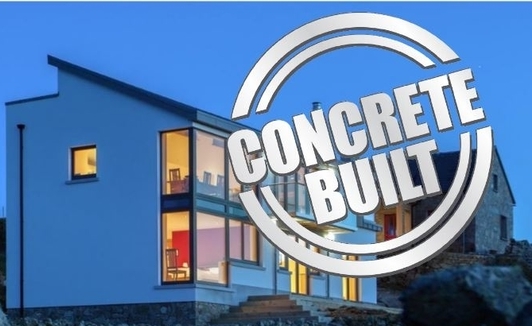If you’re buying a new home in the weeks or months ahead there are many things to consider.
From location to size, there are many things to get your head around.
However features such as the strength, durability, fire-safety, noise resilience, flood resilience and adaptability of your new home are of equal importance. All of these characteristics relate to the basic structure or fabric of your new home. Sometimes these considerations are taken for granted or even forgotten until it is too late.

Houses with a fully concrete structure or fabric have major advantages over alternative lightweight construction. Concrete does not burn, rust, warp, rot or melt and its heavyweight nature gives it excellent sound resistance and energy conserving properties.
These characteristics are naturally ‘built-in’ in concrete. This is why the vast majority of houses and apartments in Ireland have been constructed with a fully concrete structure.
First and foremost concrete is:
Built To Last
We are all familiar with the term “Your home is your castle”. In Ireland, there is a tradition of using long lasting and durable construction materials such as concrete and stone to build our homes. Because we live on an island and are exposed to wind and rain, we can avoid problems which can greatly reduce the life of buildings by using durable materials such as concrete.
Concrete is truly made to last. It can withstand major shocks, absorb sound and regulate temperatures. Concrete buildings can remain serviceable for hundreds of years, if properly maintained.
Concrete buildings remain durable with much lower associated maintenance costs and impacts than other materials which, for example, may require repainting or treatment for mould or rotting.

Concrete is also:
Adaptable
Concrete buildings can be easily reconverted and changed to accommodate any design meaning that demolition is not always the automatic course of action. Structures can often be stripped back to their concrete core, then rebuilt to new, contemporary designs and specifications, thereby ensuring efficient use of resources. In addition, given that a building’s use accounts for over 80% of its environmental impacts, the long service life of concrete buildings reduces impacts over their life-time, when compared to buildings with a shorter life.
Looked at from a whole-life perspective, a fabric first approach with concrete is the simplest construction method to design, construct and maintain long-lasting buildings which are built to last.

Concrete is also:
Energy efficient
Airtightness is a key factor in achieving energy-efficient homes. The airtightness of new concrete buildings has steadily increased in recent years as greater knowledge has informed the design and construction process. Concrete provides the basis for a robust air barrier that is not reliant on sticky tape or sealant.
As the energy use of buildings accounts for the largest part of their environmental impact, the Fabric First approach leads to reduced CO2 emissions and improves well-being and comfort.
Concrete can also store heat energy before releasing it later on, a process known as thermal mass. This has two effects on a building, firstly moderating internal temperatures and delaying peak temperatures.
Concrete is also:
Resilient
Concrete is inherently water resilient and entirely suitable for a building designed to be either waterproof, as required for water barriers, or water resilient, in the cases of our homes.
Dwellings constructed with concrete and masonry can easily be designed to be flood resilient. Despite the severe damage caused to property by flooding, the vast majority of buildings built using concrete will not suffer structural damage due to warping, rotting or rusting in a flood.
Even when a property is hit by floods, the concrete structure will dry out and won’t absorb significant amounts of water.
It’s also fire resistant. Concrete does not burn and concrete elements retain their strength at high temperatures.

For more on concrete and its benefits visit www.concretebuilt.ie






